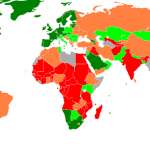History and Background (Read in Hindi)
- In 2004, the Supreme Court, had observed in Karan Johar versus the Union of India, “the National Anthem which is exhibited in the course of exhibition of newsreel or documentary or in a film, the audience is not expected to stand as the same interrupts the exhibition of the film and would create disorder and confusion, rather than add to the dignity of the National Anthem.”
- In 2006, Shyam Narayan Chouksey filed a review petition under Article 32 of the constitution against the verdict of Johar’s case.
- As a result, the earlier order was recalled and the Supreme Court decided for a review of the whole case and judgement.
- On Nov. 30, 2016, after 10 years, the Supreme Court finally announced the following key points in its judgement to the review petition:
- The apex court had made it mandatory for patrons in a theatre to stand up when the anthem is played.
- It had also asked the cinema halls to display an image of the tricolour on the screen when the anthem is played.
- The apex court further clarified that the doors of the theatre should be closed while the anthem plays to stop people moving around, but need not be bolted.
- A number of safety experts had raised questions over the earlier ruling that mandated closing of doors during the national anthem.
- The court banned dramatising, abridging or making money from the 52-second-long Jana Gana Mana and said the national flag, the Tricolour, must be displayed on the movie screen when the anthem is played.
- Theatre owners were given 10 days to implement the order.
- The court based its directions on Article 51, which provides that it is every citizen’s fundamental duty to “abide by the Constitution and respect its ideals and institutions, the national flag and the national anthem.”
Aftermath of the judgement
- The judgement ignited a debate over whether an increasingly assertive brand of nationalistic pride is stifling civil liberties.
- Just days after the Supreme Court made it mandatory for the National Anthem to be played at movie theatres, it was faced with a petition that sought to make the Anthem mandatory before the start of court proceedings.
- The top court dismissed the plea, saying its order should not be stretched.
- Ten days after its controversial order mandating the national anthem in cinemas, the Supreme Court issued a clarification: differently-abled persons need not stand up.
- Justice Dipak Misra said that the differently-abled persons have an exemption from standing while the national anthem is played in theatres before the start of a film.Conclusion and Future Concerns
- The court directed the Centre to give wide publicity to its order and send it to the chief secretaries of states and union territories.
- Obviously, the judgement is diplomatic depending on how one sees but it’s condemnable as one explores.
- The song was last ordered to be played in cinemas in India after the country’s 1962 war with China but the practice was discontinued in 1975 after most movie goers ignored it.
- The order will likely embolden Hindu groups which are pushing a strident brand of nationalism that many oppose as just a means to curb dissent.
- It is also likely to raise the debate over a resurgent wave of nationalistic activism which has sometimes seen fights break out over cricket matches and film stars.
- However, the order has triggered a debate among the intelligentsia of the country. Many have argued that people should not be forced to stand for the National Anthem in cinema halls.
- Also, it would be off-the-wall for people to stand for the National Anthem before the start of say an adult or x-rated film.
- Moreover, the national anthem is already played before movies in some states – such as Maharashtra – but the measure is often controversial, with instances of people beaten up for not standing up for the anthem.
- Recently, in October, a couple assaulted a man at a cinema in Goa for not rising during the national anthem only to discover he was paralytic and on a wheelchair.
- It is bad enough for the Supreme Court to scorn individual freedom. To do so on an issue as unserious and arbitrary as what should be done at cinema halls is terrible.
- The court said people were bound by law to show respect when the national anthem is played or recited or sung but many moviegoers said the directive was intrusive and hardly useful in promoting patriotism.
- The court mentioned a point that goes even beyond the Prevention of Insults to National Honour Act, 1971 stating that no film, drama or show of any sort can have the National Anthem as part of the show.
- It’s not the function of the courts to decide what public behaviour is ought to be. It will create a huge problem to ensure that the national anthem is not disrespected.
- Courts’ primary responsibility and jurisdiction is adjudication. Adjudication is getting delayed for decades and they are going into areas which don’t belong to them.
- However, it is evident that Supreme Court has forced something related to nationalism in the name of patriotism.











